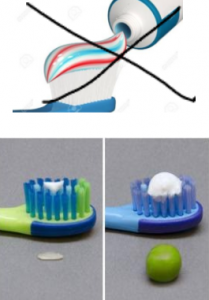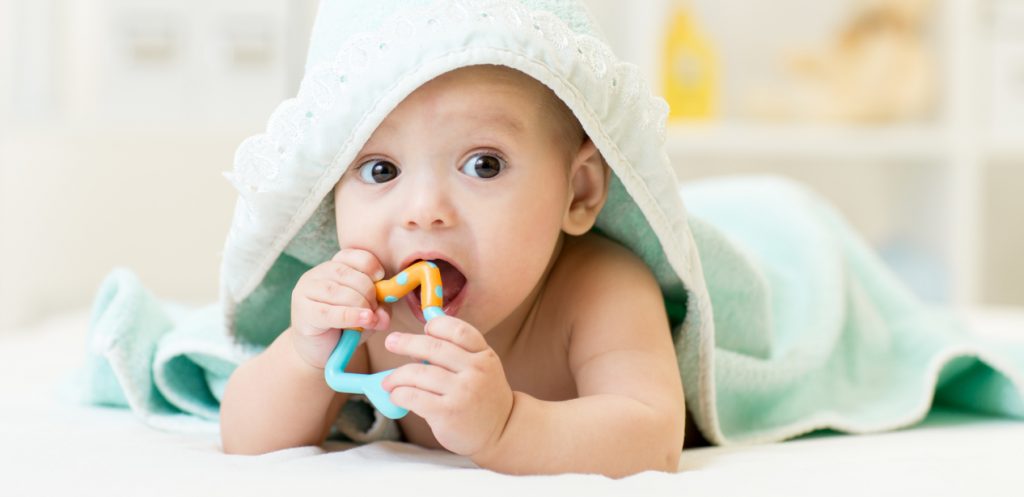Teething and Baby Dental Care are important from for your baby day one. Here’s everything you need to know on brushing those little teeth and how to care for them.
How much toothpaste do you think should go on your baby’s toothbrush?
For children under 3 years old, we recommend using a smear-layer of toothpaste (size of grain of rice)
As for children above 3 years old, we recommend using a pea-size amount of toothpaste on the brush. Please see the picture below.

When would you take your child to the dentist for the first time?
Get it Done by Age ONE sums it up: when the first tooth comes in, usually between 6 and 12 months, that’s the proper time to take your baby to his pediatric dentist. This visit is very important as it will establish a dental home for your child. Early examination and preventive care will protect your child’s smile now and in the future.
Dental problems can start very early: more than 6 out 10 kids in the UAE between 2 and 6 years of age have Early Childhood Cavities. Cavities in young children can cause bacterial infections, chronic pain, loss of weight, and missed school hours, as well as low self-esteem.
The earlier the visit, the better the chance to prevent problems. Children with healthy teeth chew food easily and smile with confidence.
When should bottle-feeding be stopped?
Children should be weaned from the bottle at 12-14 months of age. Transition should happen to a glass or sippy cup. Why? Children should not fall asleep with a bottle containing anything other than water. Breastfeeding on demand, especially at night should be avoided after teeth erupt, especially at night. Sipping juice for a baby bottle should be strictly avoided. Those habits increase the risk of having Early Childhood caries.
Should I worry about thumb sucking and pacifiers?
Sucking is perfectly normal for infants: many stop by age two. Prolonged sucking on a thumb or a pacifier can create crooked teeth and bite problems, and abnormal development of the face muscles and tongue. If the habit continues beyond age 3, we need to start looking for a solution. Pediatric dentists can offer many options; that’s why regular check ups every 6 months help.
What are the signs of my baby teething?
Babies crying at night for no reason, loss of appetite, drooling so much, low grade fever on and off, cranky babies, waking up at night randomly… Babies putting toys and objects in their mouth, babies chewing on random things fiercely…those are all symptoms of teething.
What to do when your baby is going through a tough time teething?
– Food pouch chewing/ cold (frozen/cold)
– Teether: included in a toothbrush or separate.
– Teething gels
– Rattle necklace
– Chewing on food spoons
– In extreme cases: pain-killers like Panadol
Remember this is a temporary stage and usually babies finish teething between 2 and 3 years of age.
For any further questions, follow me on @doctortayara and stay tuned with an Insta live coming soon.
More articles you might be interested in






